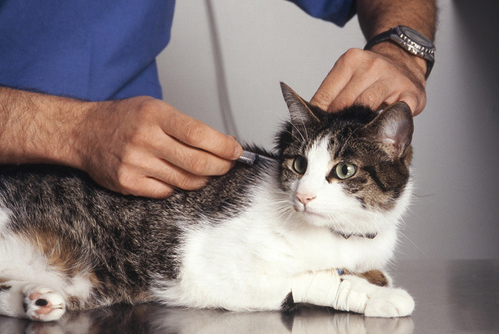Importance of vaccinating your cat
Vaccinations are an important part of your cat’s health care routine. Modern vaccinations can protect your cat against a number of fatal diseases and are a small cost to keep your feline friend fit and healthy. It is one of the easiest ways to help them live a long and healthy life. Sometimes cat owners are concerned about side effects of vaccinating their cat, but these tend to occur only in extremely rare cases.
 What are vaccines?
What are vaccines?
Vaccines prepare the body’s immune system to fight with disease- causing organisms. These contain antigens, which look like the disease- causing organism to the immune system, but don’t actually cause disease. When vaccine is introduced to the body, the immune system is slightly activated. Therefore, after having vaccine if a cat met with the disease, his immune system would be prepared to recognize and fight with it.
A vaccine is usually given by an injection under the skin, although sometimes may be given as drops into the eyes or nose.
How often should cats be given a vaccine?
During the first few hours after birth, kittens ingest maternal antibiotics that are contained in their mother’s milk. These antibiotics protect the kitten from diseases, till its own immune system becomes mature. But by twelve weeks this becomes fairly weak. It is therefore important that they receive their initial vacations at this time to ensure continued protection against diseases.
Does an adult cat need to be vaccinated every year?
This depends on the type of vaccine. For example, many feline rabies vaccines provide protection for longer than one year. Therefore vacation with a triennially approved rabies vaccine every three years is sufficient.
Types of vaccines: Core and Non core
There are two types of vaccines: Core and Non- core. The Core vaccines are important for all cats as they protect them from the widespread of diseases. Non- core vacancies are given if there is any genuine risk of exposure of infection. Decisions regarding requirement of vaccines is based on the cat’s age, lifestyle and contact with other cats. You should always discuss with your vet about what kind of vaccines your cat require.
In which diseases Core vaccines are required?
- Feline panleucopenia- This is a highly and deadly viral disease. Signs include fever, vomiting and loss of appetite. This virus is shed in the feces of an infected cat and can bear extremes of temperature and humidity for months to years. This is also resistant to most available disinfectants. Therefore vaccination is the only way to protect cats.
- Feline herpes virus and feline calicivirus - Vaccines for this virus are always combined, as these two viruses together are the main causes of upper respiratory tract infections in cats. Sneezing, runny eyes, runny nose, and fever are the most typical signs of infection. The viruses are often transmitted by direct or close contact between cats. Although vaccination does not always prevent infection with these viruses, it will help greatly reducing the seriousness of disease if a vaccinated cat does become infected.
- Rabies- Rabies is an increasing threat to cats. Because of the potential for human exposure, rabies vaccination is recommended for all cats. Vaccination is very effective in preventing disease.
In which diseases are Non- core vaccines are required?
- Feline leukaemia virus- This is a leading viral killer of cats. The virus is spread in the saliva and nasal secretions of infected cats; infection is transmitted through contact with infected cats and from an infected mother cat to her kittens. It has been strongly recommended that all kittens should be vaccinated against FeLV on the basis that younger cats are more susceptible to this infection andit cannot usually be predicted what the risks for the cat would be as it grows up.
- Chlamydophila felis- It is caused by the bacteria. The bacteria are transmitted through direct contact with an infected cat, and the highest rates of infection are in cats between five weeks and nine months of age. Affected cats can be treated successfully with proper antibiotics, but vaccination may be helpful in some circumstances.
- Bordetella bronchiseptica- It is another bacterial infection that can be part of upper respiratory infection complex in cats. This can sometimes be a problem in stressed cats and cats from large colonies. Cats with this bacterium can be treated with proper antibiotics and vacation is not required in many cats. But in colonies of cats with repeated outbreaks of disease, vaccination can play an important role.
- Feline immunodeficiency virus- This virus is common in cats that go outdoors and are involve in fighting. Infected cats may appear normal for years. However, infection eventually leads to a state of immune deficiency that hinders the cat's ability to protect itself against other infections.Vaccination provides a valuable degree of protection to cats for this disease.


